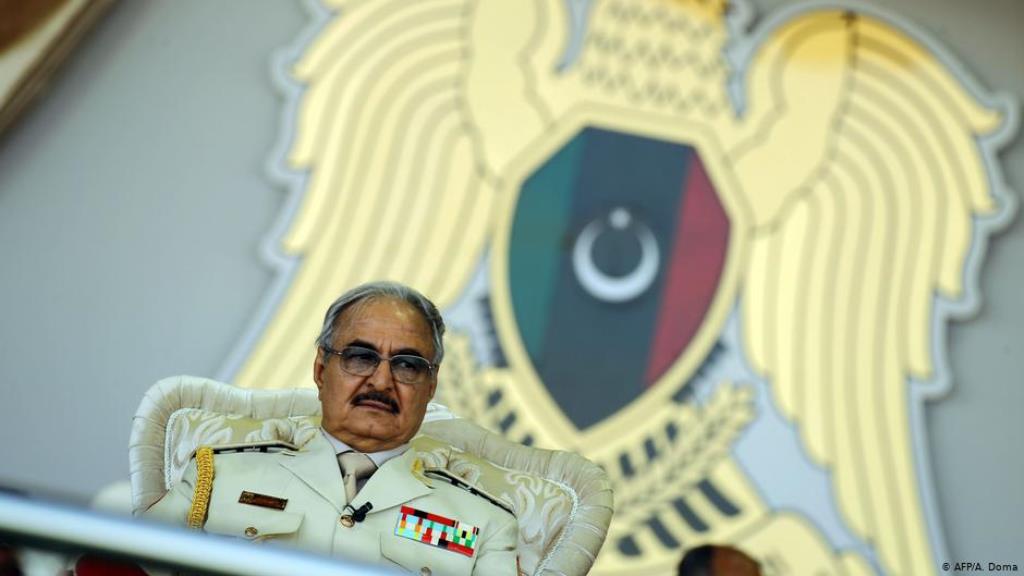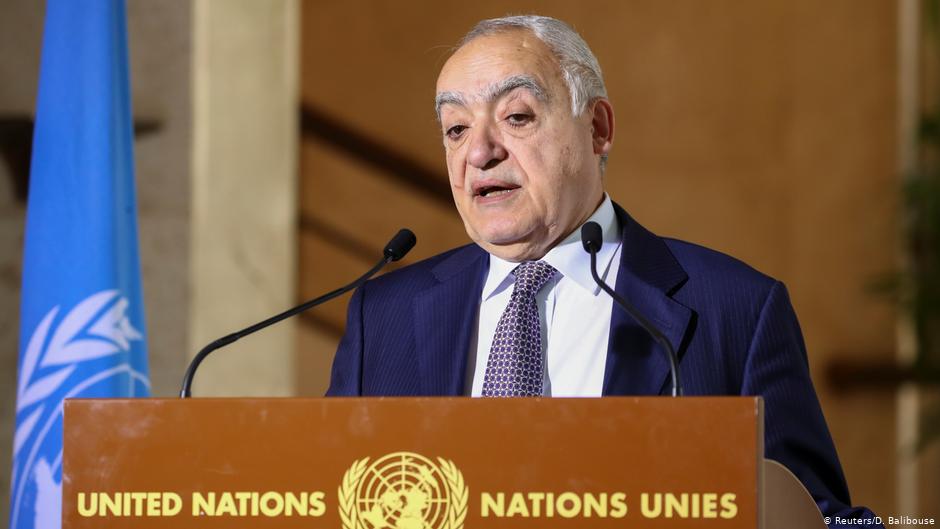Libya's war for war’s sake

The Berlin conference led to a political statement comprising some 54 points. Before we attempt to question or analyse what the conference achieved and its implications for the Libyan crisis, we must recognise that the war has taken on a reality of its own; it has also been influenced by the intervention of foreign powers in the wake of Muammar Gaddafi’s killing.
Gaddafi’s Libya was a one-person system, and with his death, his army (the various security brigades), his police and his flimsy state institutions disintegrated. And if the military intervention by NATO air forces in Libya was the right thing to do, as former President Obama believed, he did admit that his worst mistake as president was the failure to plan for the post-Gaddafi regime. Obama’s view makes total sense, given the chaos into which the country has fallen.
As the Berlin conference report concluded: ʺThe instability in the country, the external interferences, the institutional divisions, the proliferation of a vast amount of unchecked weapons and the economy of predation continue to be a threat to international peace and security by providing fertile grounds for traffickers, armed groups and terrorist organisations. These factors have allowed al-Qaida and IS (Daesh) to flourish on Libyan territory and to launch operations in Libya and in neighbouring countries ...

... They have also facilitated a destabilising wave of illegal migration in the region, as well as a significant deterioration in the humanitarian situation. We are committed to supporting Libyans in addressing those structural governance and security issues.ʺ
As regards support for the Libyans in dealing with these problems, the statement proposes three parallel tracks for a peaceful resolution of the crisis since a military solution is impossible.
Berlinʹs three-pronged plan
On a military level, the proposed three-pronged plan is based on a permanent ceasefire, a halt to foreign interference, international monitoring of any violations of the arms embargo, developing a mechanism to dismantle armed groups, integrating suitable personnel into the military and setting up unified security and military forces.With regard to the political track, the statement proposes the resumption of the political process by forming a committee of forty members, representing equally the opposing political bodies of the two warring authorities (the Tobruk government in the east and the official government in Tripoli in the west). The members should be independent personalities, who will meet in Geneva to initiate an effective political dialogue in order to put in place a practical framework for the political solution, as demanded in the Berlin statement.
This framework should be built around a functioning presidency council and a single, unified, inclusive and effective Libyan government. Together they should oversee the organisation of presidential and parliamentary elections, under international supervision.
Meanwhile, the economic track should bring together the institutions divided between the authorities in Tripoli and Benghazi, namely the Central Bank of Libya (CBL), the National Oil Corporation (NOC), the Libyan Investment Authority (LIA) and the Audit Bureau (AB).
From my perspective, as someone who is living amid the catastrophe that is Libya today, the Berlin statement, with its three tracks, might best be characterised by its good intentions (not to say naive perceptions). After all, it is counting on the hope that a peaceful solution is the only way to end the crisis. The reality on the ground argues otherwise, however.
The armed conflict has escalated progressively over nearly six years, with the alliance of Islamist militias and local tribal forces which control Tripoli versus the unified military forces led by General Haftar. It has become a grinding war in Tripoli’s suburbs. General Haftar’s forces, the so-called the "Libyan National Army", now control almost 90% of the country (including all of the east and the south as well as a significant part of the west); they also control the oil wells and the ports through which the oil is exported.
Meanwhile, the militias which make up the forces of the Government of National Accord (GNA), which is the internationally recognised government headed by Fayez al-Sarraj, control Tripoli and some important coastal cities in the west, such as Misurata and Zawiya.
The battle for Tripoli
The battle to take control of the capital (which is the greatest prize) will be decisive. Whoever controls Tripoli controls Libya. This has been the case since the Crusaders (the Knights of St. John) occupied the city in 1523 and appointed the priest Gaspare de Sangiiessa as its governor. The latter ruled Tripoli for nearly three decades, until its inhabitants sought the help of the Ottomans who eventually freed them from the Crusaders in 1551.
The Ottomans went on to rule Libya for 360 years until 1911 when the Ottoman Empire ceded control of Libya to Italian colonial power under the Treaty of Lausanne. This required the Sublime Porte (ed: the central government of the Ottoman Empire) to withdraw all of its soldiers, officers, and employees from Tripoli and Benghazi.There is the irony of history repeating itself, as Karl Marx noted: "History repeats itself, first as tragedy, then as farce". The government in Tripoli appealed to Erdogan, president of the Turkish republic of Ottoman and Ataturk heritage (filled with nostalgia for the Ottoman sultans of bygone glory). Lo and behold, Erdogan hurriedly despatched military advisers and well-equipped mercenaries who are ethnically Turkmen i.e. of Turkish origin, from the ranks of the Syrian opposition.
It is evident from Erdogan's repeated statements that his objective, behind the direct Turkish military presence in the heart of Tripoli, is not merely to support and protect the Islamist government on the pretext that it commands international legitimacy. And for sure, it is not in order to resolve the crisis peacefully, since the crisis has become, thanks to his intervention, more complex politically and militarily.
Erdogan has flirted with the masses of his party – which is allied with the fascist Nationalist Movement Party (MHP) – in the language of populism over the growing regional power of Turkey after the signing of an agreement to set the maritime borders with the authorities in Tripoli. Turkey, as Erdogan sees it, has become the vanguard in the Mediterranean to confront the axis of Israel, Egypt, Greece and Cyprus, members of the Eastern Mediterranean gas forum.
Syrian catastrophe in miniature
Recep Tayyip Erdogan is flaunting the benefits of Turkish intervention as satisfying the aspirations of Turkish contractors who controlled projects in Libya worth U.S.$ 28.9 billion in the years leading up to the 17 February 2011 revolution.
He went so far as to use old-fashioned colonial justifications while speaking at the inauguration ceremony for the first Turkish-made submarine: ʺOur great leader Kamal Ataturk was a combat officer in the Ottoman army during the Italian invasion of Libya. Hence it’s our duty to be there and to fight. We have a million people of Turkish origin living in Libya.ʺ
While Turkish and Russian intervention will only aggravate the situation, General Haftar has been rallying his frontline forces in the outskirts of the capital in their confrontation with the Islamist militias and their Turkish allies. His forces are directly supported by Egypt and the UAE, and covertly supported by France and Russia, with the goal of storming the capital and toppling the Islamist regime.
Haftar will only accept total control of Tripoli, or retreat from it in the face of superior military power, and that will not happen except through the intervention of a huge well-equipped Turkish army. As for General Haftar's approach to the truce, the ceasefire and the projects to resolve the political issues, his manoeuvring is purely tactical and designed to avoid being held to account internationally.
In sum, no political solution is expected to bring an end to the war raging in the suburbs of southern Tripoli. It is not a war brought about by political differences which can be resolved by sharing power on the basis of "no-one wins and no-one loses". It is war for war’s sake.
Faraj Alasha
© Qantara.de 2020
Translated from the Arabic by Chris Somes-Charlton
